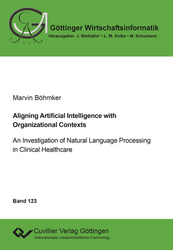| Departments | |
|---|---|
| Book Series (97) |
1382
|
| Nachhaltigkeit |
3
|
| Gesundheitswesen |
1
|
| Humanities |
2375
|
| Medienwissenschaften | 16 |
| Theology | 57 |
| Philosophy | 102 |
| Law | 424 |
| Economics | 854 |
| Social sciences | 417 |
| Sports science | 48 |
| Psychology | 233 |
| Educational science | 190 |
| History | 183 |
| Art | 111 |
| Cultural studies | 166 |
| Literary studies | 117 |
| Linguistics | 89 |
| Natural Sciences |
5408
|
| Engineering |
1798
|
| Common |
98
|
|
Leitlinien Unfallchirurgie
5. Auflage bestellen |
|
Advanced Search
Aligning Artificial Intelligence with Organizational Contexts (Volume 123) (English shop)
An Investigation of Natural Language Processing in Clinical Healthcare
Marvin Böhmker (Author)Preview
Extract, PDF (310 KB)
Table of Contents, PDF (140 KB)
Künstliche Intelligenz (KI) bietet enormes Potenzial, um Herausforderungen wie Fachkräftemangel und eine wachsende Zahl älterer Patientinnen und Patienten zu bewältigen. Gleichzeitig jedoch stellt die soziotechnische Einbettung von KI in Organisationen eine komplexe Aufgabe dar, deren Misslingen zu Wissensverlust oder Unzufriedenheit im Team führen kann. In dieser Dissertation werden die entscheidenden Komponenten dieses KI-Alignments systematisch untersucht. Vier Studien – davon zwei auf allgemeiner Ebene und zwei mit Fokus auf Natural Language Processing (NLP) im klinischen Bereich – beleuchten, wie KI und organisatorische Anforderungen bestmöglich aufeinander abgestimmt werden können. Dabei entsteht ein Rahmenwerk, das sowohl Forschenden als auch Praktikerinnen und Praktikern hilft, KI-Lösungen gezielt zu planen, zu integrieren und kontinuierlich zu verbessern. Zugleich eröffnet die Arbeit neue Perspektiven für Forschung und Anwendung, vor allem durch die Betrachtung von KI in spezifischen Kontexten und durch die gezielte Identifikation bisher unbeachteter Aspekte.
Artificial Intelligence (AI) offers enormous potential for tackling challenges such as staffing shortages and a growing elderly population with increasing healthcare needs. However, effectively embedding AI in organizations is a complex sociotechnical endeavor; if misaligned, it can lead to knowledge loss or employee dissatisfaction. This dissertation systematically examines the key components of AI alignment. Four studies—two at a general level and two focused on Natural Language Processing (NLP) in clinical settings—explore how AI can best be harmonized with organizational requirements. The resulting framework supports researchers and practitioners alike in planning, integrating, and continuously refining AI solutions. Moreover, this work opens new horizons in research and practice by examining AI in specific contexts and identifying aspects that have received little attention thus far.
| ISBN-13 (Hard Copy) | 9783689527846 |
| ISBN-13 (eBook) | 9783689527853 |
| Final Book Format | A5 |
| Language | English |
| Page Number | 218 |
| Lamination of Cover | glossy |
| Edition | 1. |
| Book Series | Göttinger Wirtschaftsinformatik |
| Volume | 123 |
| Publication Place | Göttingen |
| Place of Dissertation | Göttingen |
| Publication Date | 2025-03-06 |
| General Categorization | Dissertation |
| Departments |
Economics
Business economics Social sciences Kommunikations- und Informationswissenschaften Informatics |
| Keywords | Artificial Intelligence, Künstliche Intelligenz, Natural Language Processing, Sprachverarbeitung, Information Systems, Informationssysteme, Wirtschaftsinformatik, Design Science Research, Literature Review, Healthcare, Gesundheitswesen, Documentation Processes, Dokumentationsprozesse, Taxonomy, Taxonomie, Human-AI Collaboration, Mensch-KI Kollaboration, AI Alignment |








